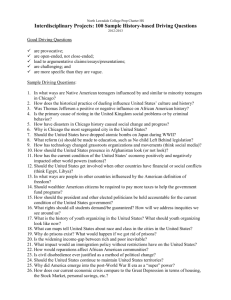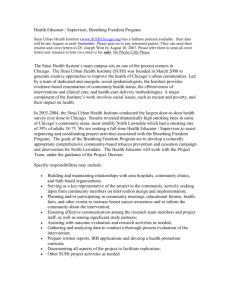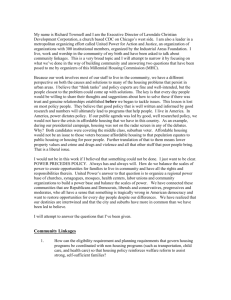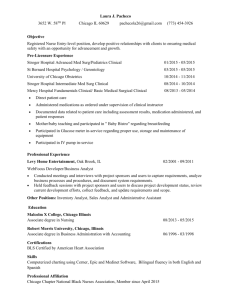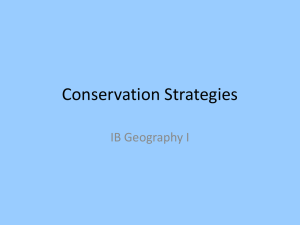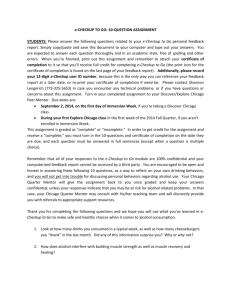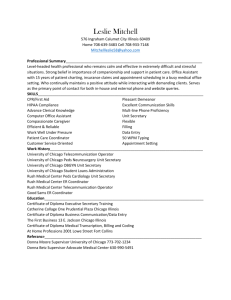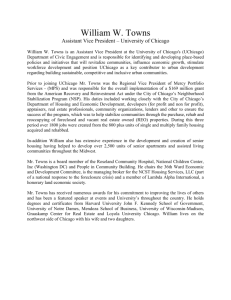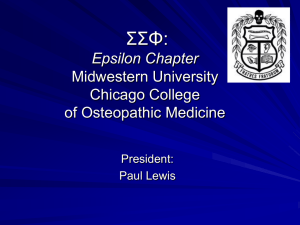Science - North Lawndale College Prep
advertisement
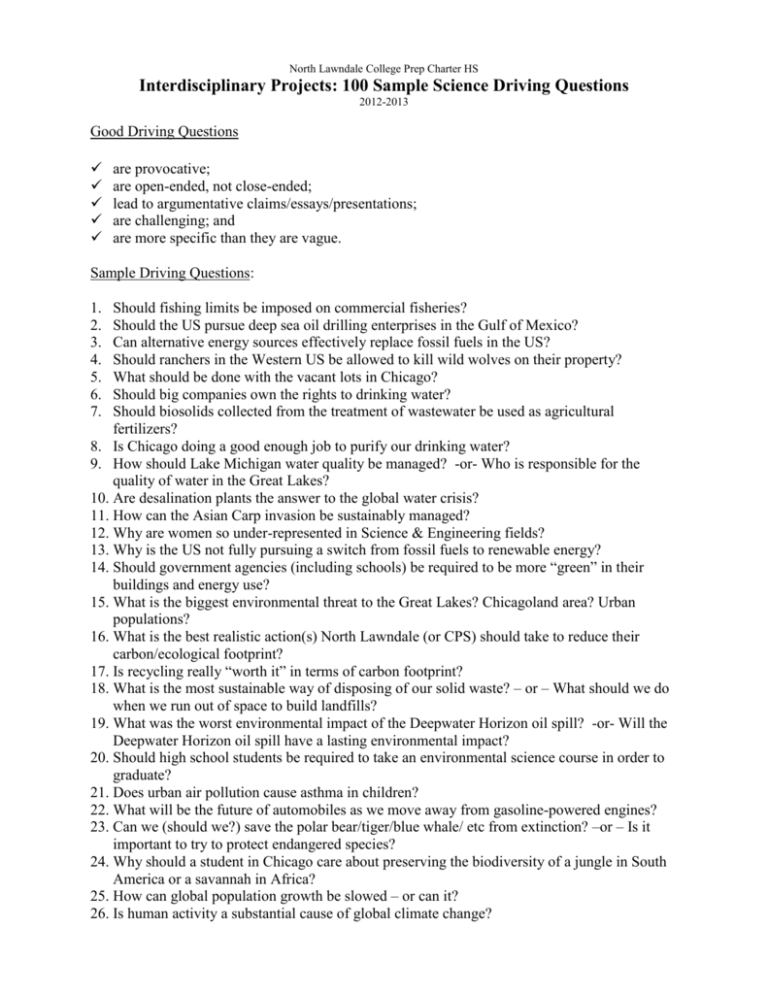
North Lawndale College Prep Charter HS Interdisciplinary Projects: 100 Sample Science Driving Questions 2012-2013 Good Driving Questions are provocative; are open-ended, not close-ended; lead to argumentative claims/essays/presentations; are challenging; and are more specific than they are vague. Sample Driving Questions: 1. 2. 3. 4. 5. 6. 7. Should fishing limits be imposed on commercial fisheries? Should the US pursue deep sea oil drilling enterprises in the Gulf of Mexico? Can alternative energy sources effectively replace fossil fuels in the US? Should ranchers in the Western US be allowed to kill wild wolves on their property? What should be done with the vacant lots in Chicago? Should big companies own the rights to drinking water? Should biosolids collected from the treatment of wastewater be used as agricultural fertilizers? 8. Is Chicago doing a good enough job to purify our drinking water? 9. How should Lake Michigan water quality be managed? -or- Who is responsible for the quality of water in the Great Lakes? 10. Are desalination plants the answer to the global water crisis? 11. How can the Asian Carp invasion be sustainably managed? 12. Why are women so under-represented in Science & Engineering fields? 13. Why is the US not fully pursuing a switch from fossil fuels to renewable energy? 14. Should government agencies (including schools) be required to be more “green” in their buildings and energy use? 15. What is the biggest environmental threat to the Great Lakes? Chicagoland area? Urban populations? 16. What is the best realistic action(s) North Lawndale (or CPS) should take to reduce their carbon/ecological footprint? 17. Is recycling really “worth it” in terms of carbon footprint? 18. What is the most sustainable way of disposing of our solid waste? – or – What should we do when we run out of space to build landfills? 19. What was the worst environmental impact of the Deepwater Horizon oil spill? -or- Will the Deepwater Horizon oil spill have a lasting environmental impact? 20. Should high school students be required to take an environmental science course in order to graduate? 21. Does urban air pollution cause asthma in children? 22. What will be the future of automobiles as we move away from gasoline-powered engines? 23. Can we (should we?) save the polar bear/tiger/blue whale/ etc from extinction? –or – Is it important to try to protect endangered species? 24. Why should a student in Chicago care about preserving the biodiversity of a jungle in South America or a savannah in Africa? 25. How can global population growth be slowed – or can it? 26. Is human activity a substantial cause of global climate change? 27. Should the US government ban the use of fossil fuels to help solve the issue of climate change? 28. How can understanding the behavior of other animals help us understand the behaviors of humans? 29. Were dinosaurs the evolutionary predecessors to birds? 30. Should cloning of human organs, to be used in case of organ failure, be allowed? 31. Should a “sin tax” be placed on foods that lead to obesity? 32. Should couples be allowed to “design” their baby? 33. How does personal genetic information affect self-identity and society’s perceptions? 34. How does society balance current scientific limitations and social risk with long-term benefits? 35. Should researchers be allowed to patent genes? 36. How can exercise help prevent disease? 37. Should all children receive recommended vaccines? 38. Should people become vegetarians? 39. Should euthanasia (physician assisted suicide) be legal? 40. Are cell phones safe? 41. Should performance enhancing drugs (such as steroids) be accepted in sports? 42. Should the US send a manned mission to Mars? 43. Is there intelligent life on other planets? 44. What is the most important impact of human space travel? 45. How is the global Earth system changing? 46. What caused ancient humans to migrate out of Africa? 47. How does the Earth system respond to natural and human-induced changes? 48. What are the consequences of change in the Earth system for human civilization? 49. How well can we predict the changes in the Earth system that will occur in the future? 50. Biodiversity: Why preserve life's variety? 51. Environment: How fragile is our planet? 52. Genomics: What does the genome reveal about our species? 53. Biotechnology: How is biotechnology changing the world? 54. Evolution: What is life's history on Earth? 55. Science policy: How do science and policy intersect? 56. From biodiversity to biocomplexity: How are these concepts the same or different? 57. Why is the time right for biocomplexity research? 58. Can the science of biocomplexity predict how systems may or may not survive on Earth? 59. How does climate affect the way we eat? 60. How does the number of legs an animal has affect its life? 61. How do we use our senses to discover our world? 62. What impact did landing on the Moon have on our lives? 63. How does our school impact the environment? 64. What makes a good sneaker? 65. How can our school save electricity? 66. Is our drinking water safe? 67. Which flashlight batteries are most cost-effective? 68. What makes scientific evidence reliable? 69. Is cloning safe? 70. How many different species of insects live in the field behind our school? 71. Should we allow for genetic engineering to prevent diseases and illnesses? 72. Is deforestation in the Amazon something we in Chicago should be concerned about? Why or why not? 73. Is organic food more nutritious than conventionally-raised food? 74. Are the daily administrative, student, and teacher behaviors at my school helping to conserve or degrade our natural environment? 75. Can the use of nuclear weapons be justified? 76. How can we, your family and society, lessen our impact on Global Climate Change and what data supports these solutions? 77. How can you as a student use simple tools and instruments (remote sensing) to gather data and evidence to draw conclusions about patterns of weather and climate in your own environment? 78. How is climate change and global warming evident in North Lawndale? 79. How do changes in land use affect local water quality? 80. How do changes in land use affect local temperature and precipitation? 81. How do changes in land use affect carbon sequestering? 82. How do changes in land use affect air quality? 83. How do changes in land use affect biodiversity? 84. How will animals adapt to climate change? 85. What’s in the atmosphere and why should I care? 86. How can I lessen my carbon footprint, here in Chicago? 87. What are the major sources of nitrogen export into the Chicago River and how are these best controlled? 88. What are the primary mechanisms of nitrogen retention in the watershed, and how are these linked to hydrologic processes? 89. What is the relative impact of catastrophic events (e.g., major local storms, hurricanes) in determining water quality and the status of Lake Michigan and/or the Chicago River? 90. Are surface and groundwater supplies sustainable given the mix of population growth, lowand medium-density urban sprawl, periodic drought, and potential ground and surface-water contamination from urban and agricultural sources? 91. How do humans "compete" in an ecosystem? 92. How does my social life affect my cells? 93. How does the debate over genetic engineering affect our future? 94. Are you really what you eat? 95. What do I need to survive? 96. How did different human races/ethnicities evolve? 97. How did dogs become domesticated? 98. Should humans use selective breeding to intensify distinctive characteristics in certain dog species? 99. Is AIDS no longer a “death sentence”? 100. How have new technologies changed the way we perceive beauty?
